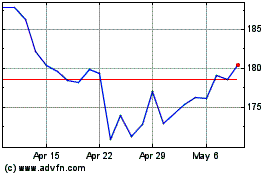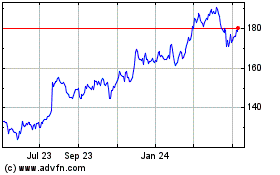Today's Top Supply Chain and Logistics News From WSJ
February 02 2018 - 7:02AM
Dow Jones News
By Paul Page
Sign up: With one click, get this newsletter delivered to your
inbox.
Trucking's capacity crunch is starting to squeeze earnings
across corporate America. Companies including candy sellers,
pharmaceutical distributors and agriculture suppliers have been
pointing to higher shipping costs that shaved profits in the most
recent quarter, and the WSJ's Austen Hufford writes that several
businesses say they are girding for still higher costs this year.
Tight trucking capacity is only part of the story: Shippers
including Prestige Brand Holdings Inc. and Hershey Co. also point
to pressures from higher warehousing costs and rising diesel fuel
prices that are trimming margins. Cardboard maker Packaging Corp.
of America says higher shipping costs sliced 4 cents a share from
its adjusted fourth-quarter profit. The companies are moving faster
to tap into growing U.S. and global economies but the
transportation costs probably haven't peaked yet. While truckers
are adding capacity, they're also setting plans to embed the higher
rates in the spot market into new shipping contracts this year.
United Parcel Service Inc. is trying to ensure it isn't caught
short-handed again by unexpected surges in volume. The parcel giant
is scaling up its capital spending to $7 billion this year, the
WSJ's Paul Ziobro reports. The company is moving to bolster its
operations in the air and on the ground after a tough fourth
quarter that saw the company whip-sawed between fast-rising demand
and the soaring costs of handling a flood of packages. UPS says it
spent an extra $125 million as it scrambled to lease trucks and
planes while clearing away backlogs early in the peak season. The
company's overall operating profit rose 3.2% in the fourth quarter,
well behind the 11% gain in revenue. New upgrades include expanded
automation at sorting centers and 18 jumbo jets, including 14
Boeing Co. 747-8 freighters. That will give UPS more capacity to
handle any growth in the near future, and it will speed up an
digital commerce-driven overhaul of U.S. distribution networks.
Amazon.com Inc. is starting to focus on reining back costs now
that it's built an online juggernaut. The Seattle company's
quarterly profit during the all-important holiday quarter topped $1
billion for the first time, as Amazon demonstrated a stronger
fiscal discipline that it plans to extend this year. The WSJ's
Laura Stevens reports the strong performance came with better
efficiency at the company's burgeoning network of fulfillment
centers, and that Chief Financial Officer Brian Olsavsky expects
more cost cutting and productivity moves, "specifically in our
warehouses." The company is still expanding at a rapid rate, but
revenue growth in the fourth quarter still outpaced costs, while
the 31% increase in shipping expenses was slower than the growth in
recent quarters -- a notable achievement during the busy holiday
period. Shipping costs have more than doubled in three years but
Amazon now wants to keep its sales expanding at a fast pace while
pulling back the cost of getting goods to customers.
E-COMMERCE
China's biggest digital commerce business wants to use its
online payment operation to open doors to the physical retail
world. Alibaba Group Holding Ltd. is taking a 33% stake in its
financial services affiliate Ant Financial Services Group, a move
that could set up the payments operation for a public offering and
signals broader changes as Alibaba expands and redraws its digital
commerce platform. The WSJ's Liza Lin reports that the tighter
tie-up with Ant may allow Alibaba to build up services such as
mobile payments and linking them to traditional brick-and-mortar
businesses. It would also give Alibaba more firepower to expand in
overseas markets such as India, Japan and South Korea, where
payment methods are a critical piece of online retail sales. Its
expansion into physical retail business is expensive, as well.
Alibaba put $2.9 billion in Chinese big-box retailer Sun Art Retail
last year, and more investments likely are on the way.
QUOTABLE
IN OTHER NEWS
U.S. worker productivity grew below its long-run average for the
seventh straight year in 2017. (WSJ)
The U.S. manufacturing sector maintained its momentum in
January. (WSJ)
U.S. car sales rose 1% in January in an underwhelming start to
the year. (WSJ)
Apple Inc. is lowering sales expectations after higher iPhone
prices helped deliver record revenue and profit in the past
quarter. (WSJ)
Consumer-goods supplier Unilever PLC bucked a trend roiling its
American rivals by selling more products at higher prices in the
fourth quarter. (WSJ)
Mattel Inc. posted a steep sales decline during the key holiday
quarter. (WSJ)
Lenovo Group Ltd. says a semiconductor shortage that weighed on
its supply chain last year is easing. (WSJ)
Tesla Inc. sold $546 million of bonds backed by vehicle lease
payments, extending a search for cash to ramp up production of its
mass-market sedan. (WSJ)
A federal study shows a widely-accepted industry estimate of U.
S. truck driver jobs could be over-stated by as much as 40%.
(Trucks.com)
Sears Holdings Corp. laid off about 220 employees at its
corporate headquarters. (Chicago Tribune)
Canadian grocer Metro Inc. says its buy of meal-kit company
MissFresh drove more traffic to its stores in last quarter.
(Financial Post)
Norway's DNB Bank cut it bad loan portfolio by $1 billion as
shipping and offshore markets started turning around. (Shipping
Watch)
China will expand freight rail capacity by 5% this year to
ensure flow of coal supplies. (Reuters)
BNSF Railway will hold its capital spending steady this year at
$3.3 billion. (Railway Age)
Workers at three Cargill soy processing plants and ports in
Argentina went on strike. (World-Grain)
Toyota Motor Corp. is moving to a cloud-based supply-chain
management system called RapidResponse. (Automotive Logistics)
Global air freight volume rose 9% in 2017, three times more than
capacity growth, the International Air Transportation says. (Air
Transport World)
Roadrunner Transportation Systems Inc. issued re-stated
financial reports that included a $360 million net loss for 2016.
(DC Velocity)
Truck-trailer volume in U.S. intermodal operations jumped 12.2%
in the fourth quarter. (Logistics Management)
Massachusetts-based Road One IntermodaLogistics is merging with
North Carolina-based Robin Hood Container Express. (Fleet
Owner)
ABOUT US
Paul Page is deputy editor of WSJ Logistics Report. Follow him
at @PaulPage, and follow the entire WSJ Logistics Report team:
@brianjbaskin , @jensmithWSJ and @EEPhillips_WSJ. Follow the WSJ
Logistics Report on Twitter at @WSJLogistics.
Write to Paul Page at paul.page@wsj.com
(END) Dow Jones Newswires
February 02, 2018 06:47 ET (11:47 GMT)
Copyright (c) 2018 Dow Jones & Company, Inc.
Packaging (NYSE:PKG)
Historical Stock Chart
From Mar 2024 to Apr 2024

Packaging (NYSE:PKG)
Historical Stock Chart
From Apr 2023 to Apr 2024
